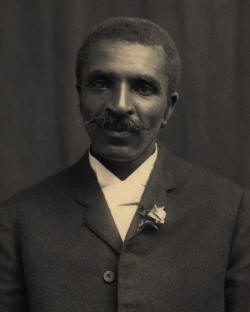

Queer Places:
Tuskegee University, Tuskegee, AL 36088, Stati Uniti
Iowa State University, Ames, Iowa 50011, Stati Uniti
Simpson College, 701 N C St, Indianola, IA 50125, Stati Uniti
Minneapolis High School, 602 Woodland Ave, Minneapolis, KS 67467, Stati Uniti
 George Washington Carver (1860s[2][3]
– January 5, 1943), was an American botanist and inventor. He actively
promoted alternative crops to cotton and methods to prevent soil depletion.
George Washington Carver (1860s[2][3]
– January 5, 1943), was an American botanist and inventor. He actively
promoted alternative crops to cotton and methods to prevent soil depletion.
While a professor at Tuskegee Insitutute, Carver developed techniques to improve soils depleted by repeated plantings of cotton. He wanted poor farmers to grow alternative crops, such as peanuts and sweet potatoes, as a source of their own food and to improve their quality of life. The most popular of his 44 practical bulletins for farmers contained 105 food recipes using peanuts. Although he spent years developing and promoting numerous products made from peanuts, none became commercially successful.[4]
Apart from his work to improve the lives of farmers, Carver was also a leader in promoting environmentalism.[5] He received numerous honors for his work, including the Spingarn Medal of the NAACP. In an era of very high racial polarization, his fame reached beyond the black community. He was widely recognized and praised in the white community for his many achievements and talents. In 1941, Time magazine dubbed Carver a "Black Leonardo".[6]
Carver never married. At age forty, he began a courtship with Sarah L. Hunt, an elementary school teacher and the sister-in-law of Warren Logan, Treasurer of Tuskegee Institute. This lasted three years until she took a teaching job in California.[33] In her 2015 biography, Christina Vella reviews his relationships and suggests that Carver was bisexual and constrained by mores of his historic period.[34]
When he was seventy, Carver established a friendship and research partnership with the scientist Austin W. Curtis, Jr. This young black man, a graduate of Cornell University, had some teaching experience before coming to Tuskegee. Carver bequeathed to Curtis his royalties from an authorized 1943 biography by Rackham Holt.[35] After Carver died in 1943, Curtis was fired from Tuskegee Institute. He left Alabama and resettled in Detroit. There he manufactured and sold peanut-based personal care products.[36]
Upon returning home one day, Carver took a bad fall down a flight of stairs; he was found unconscious by a maid who took him to a hospital. Carver died January 5, 1943, at the age of 78 from complications (anemia) resulting from this fall. He was buried next to Booker T. Washington at Tuskegee University. Due to his frugality, Carver's life savings totaled $60,000, all of which he donated in his last years and at his death to the Carver Museum and to the George Washington Carver Foundation.[37]
On his grave was written, He could have added fortune to fame, but caring for neither, he found happiness and honor in being helpful to the world.
My published books: